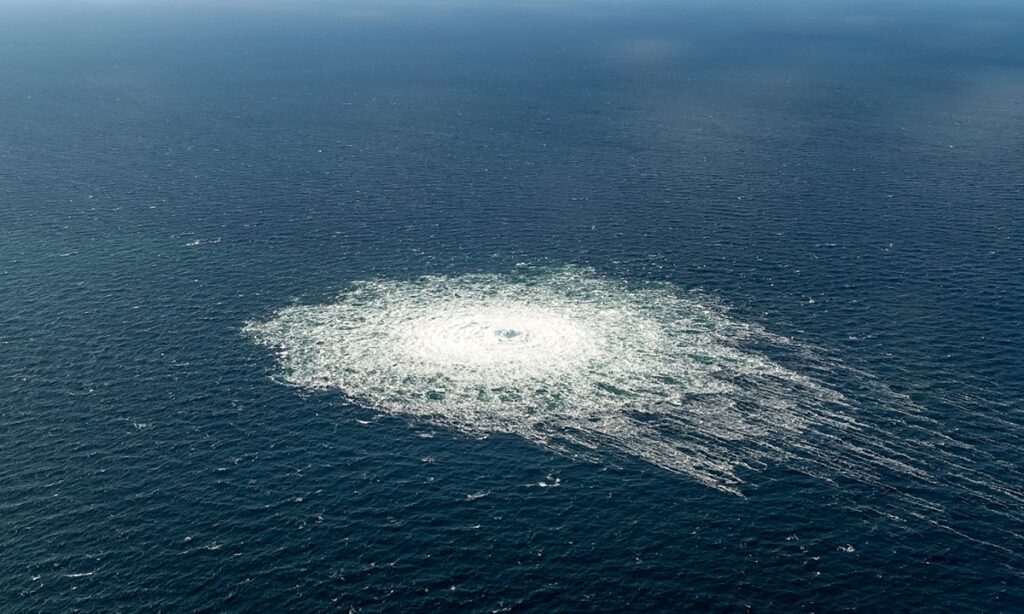NATO on Thursday released a statement on the Nord Stream pipeline leaks, calling it “the result of deliberate, reckless, and irresponsible acts of sabotage.” It also said, “Any deliberate attack against Allies’ critical infrastructure would be met with a united and determined response.” But Chinese experts said NATO’s statement came too early, as the truth behind the leaks is yet to surface, and by releasing such a statement, NATO wants to absolve responsibility on the issue and take the high moral ground, so that it could continue to work on its strategic goal of containing Russia and controlling Europe.
NATO could carry out collective defense based on Article 5 of the North Atlantic Treaty if allies’ critical infrastructure comes under attack, but before the perpetrator is identified, NATO’s statement is merely political posturing, they said.
Song Zhongping, a mainland military expert and TV commentator, believes that the pipeline leaks are not only an issue about energy, but more about political rivalry. The US and Russia are already engaged in a war of words over the issue. Russian Foreign Ministry Spokeswoman Maria Zakharova said on Thursday that the place where the pipeline took place is an area fully controlled by US intelligence agencies. She also demanded US President Joe Biden issue a reply as to whether the US had carried out its threat over the pipelines when officials in Washington asserted early this year that Nord Stream 2 would never come into service.
In response, White House Press Secretary Karine Jean-Pierre said, “the President said that NS2 wouldn’t become operational and we would work with Germany on that.” She also denied the allegation that the US is responsible with a simple “No.”
“When an investigation is held hostage by politics, truth may be hidden,” said Song, noting that the Nord Stream pipeline leaks may represent a turning point in the Russia-Ukraine conflict.
On Friday, four regions in south-eastern Ukraine will be incorporated into Russian territory. Putin’s Russia has prepared for a big showdown with the US and the West, at least judging from the Kremlin’s posture, said Chinese experts. Against this backdrop, the sabotage of the Nord Stream pipelines will add more uncertainty and increase the likelihood of an armed conflict between the US and Russia, according to He Zhigao, a research fellow with the Institute of European Studies, the Chinese Academy of Social Sciences. The strategic competition between the US-led West and Russia will continue or even intensify.
Meanwhile, the relationship between Europe and the US may start seeing cracks. No matter what is the truth behind the pipeline leaks, Europe, especially Germany, needs to consider its lost leverage in negotiating with Russia while being handcuffed to the US agenda, said the expert. Germany invested a lot of energy and money into Nord Stream 2, hoping to get cheap energy from Russia. Although the pipeline was suspended after the Russia-Ukraine conflict started, Germany still hopes that the pipeline resumes operation when relations with Russia get better. Germany’s former chancellor Angela Merkel just warned that taking Russian President Vladimir Putin’s words seriously is “a sign of political wisdom” not weakness.
“For Europeans and Germans, Russia is a neighbor that cannot be relocated. Relations with Russia have to continue, no matter what means are used, though cooperative means being preferred,” said He.
If Russia’s gas supplies to Germany are cut, it will be a big challenge to Germany’s energy security and affect the livelihoods of ordinary people. Germany may be forced to rely on US resources and find itself even more closely tied to the US. If this happens, there will be nothing like strategic autonomy that Germany and Europe are pursing.
Germany’s former chancellor Angela Merkel just warned that taking Russian President Vladimir Putin’s words seriously is “a sign of political wisdom” not weakness. The question is whether the West is willing to negotiate with Russia over a relatively balanced European security framework that Russia also accepts. Maybe Europe is willing to, but how about the US?
(Global Times)




